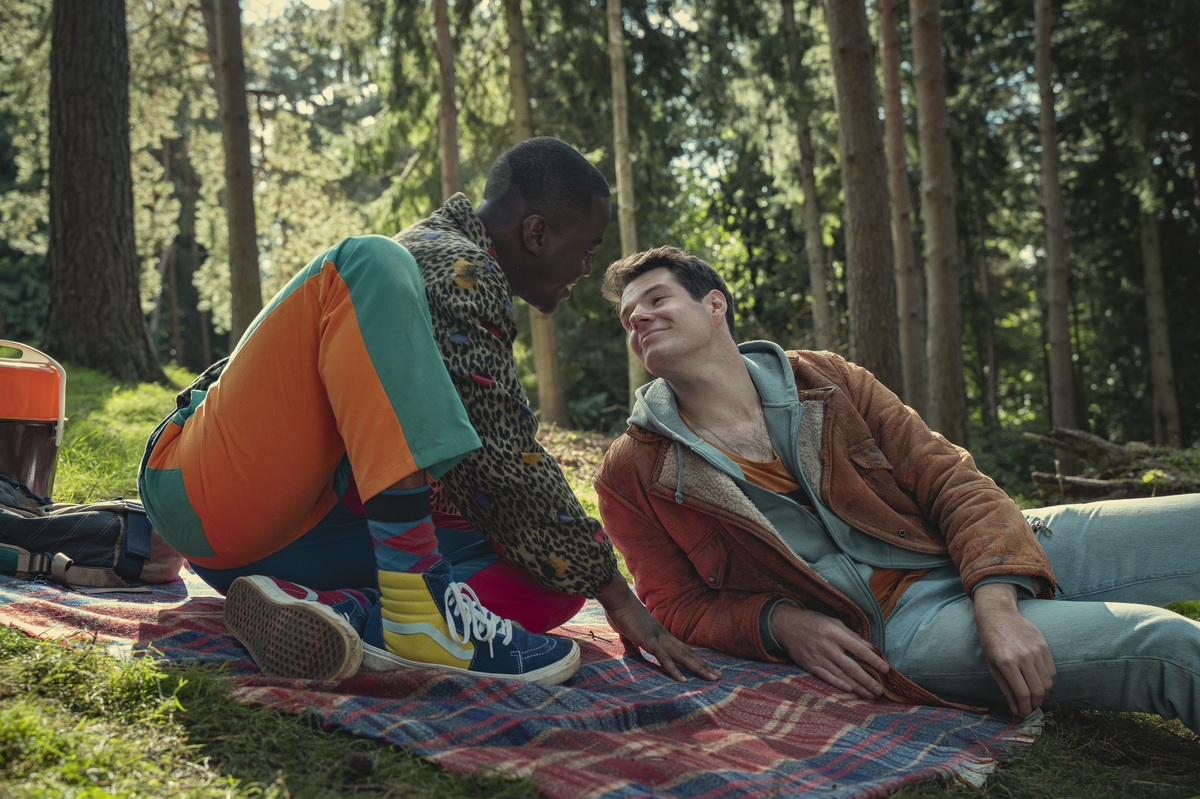‘Sex Education’s’ gay teen Eric takes a risky trip to Nigeria. How realistic is it?

Enlarge this image
The character Eric Effiong (portrayed by actor Ncuti Gatwa) is an openly gay British teen in the Netflix series Sex Education. In a storyline in the new season, Eric travels to his mother’s homeland of Nigeria — where sex between men and sex between women are against the law — for a family wedding.
Sam Taylor/Netflix
hide caption
toggle caption
Sam Taylor/Netflix

Enlarge this image
Bisi Alimi, an actor-turned-activist, made headlines when he came out as gay on Nigerian television.
Claire Eggers/NPR
hide caption
toggle caption
Claire Eggers/NPR

Goats and Soda
I Feel Like ‘I Am Orlando’ Though I Live Thousands Of Miles Away
This interview has been edited for length and clarity. Warning: SPOILERS ABOUND for season 3 of Sex Education.
Eric and his mom go to Lagos, Nigeria for a family wedding. Dad stays home. What do you have to say about Eric’s relationship with his mom and her concerns about the trip to Nigeria?
I think that scenario of the mother who is accepting of her child and understanding the homophobia in Nigeria, the expectation of homophobia, is very, very accurate.
That’s why Eric’s mom tells him to tone down his flashy outfits and eschew his eye makeup after they arrive in Lagos.
She is afraid that this loving son who is gay is going to a country that is homophobic. It is the experience of every mother in Nigeria who has a queer child, the fear that something will happen to them even if you don’t know what it will be.

Enlarge this image
In the new season, Eric’s mom warns her son to be discreet when they visit Nigeria, but he ends up going to an underground LGBTQ party with a new gay friend.
Sam Taylor/Netflix
hide caption
toggle caption
Sam Taylor/Netflix

Enlarge this image
Eric, right, wears traditional garb for a family wedding in Nigeria.
Sam Taylor/Netflix
hide caption
toggle caption
Sam Taylor/Netflix

Goats and Soda
A Place For LGBT People To Tell How They Faced Hate – And Survived
But his mother doesn’t do that.
That for me didn’t speak into the narrative of the mother who is scared for her son in a country that is extremely homophobic.
Would the family really call the police and say «My openly gay son is missing?»
No, his sexuality would not be mentioned.
Would the police be helpful?
Nigerian police will tell you to go home and wait, your child will come back.
What do you think of the character of Eric?
To see this very bright, inspiring character who is queer and who is Black and who is also a second generation immigrant is something you don’t really see on British TV. And that for me is a massive plus for Sex Education. A lot of young gay men in Nigeria see themselves in Eric. He is such a loved character — considering that he’s not even Nigerian. [The family of actor Ncuti Gatwa immigrated to Scotland from Rwanda when he was a small child.]
Eric is a representation of what is possible. And a realization of what is possible if you pack your bag and leave Nigeria and live in New York or London. You can live that life and you can live it well. You can live it like Eric: flamboyant, fabulous and assertive.
And his father accepting him after he came out — that for me is also very, very powerful because some Nigerian fathers will never do that.
How is your relationship with your father?
My relationship with my father is like the American saying: «Don’t ask, don’t tell.»
What do you think of Eric’s relationship with fellow student Adam, who used to bully him but then comes to fall in love with him?
There’s an idea in Britain that if you’re white and gay, you’re more likely to be in tune with your sexuality than if you’re Black and gay.

Enlarge this image
In season 3, Eric begins a relationship with classmate Adam Groff (Connor Swindells), who used to bully him. Bisi Alimi, a gay activist living in London, notes that their match veers from typical TV tropes: «The person struggling with his sexuality is the white character, and the person who is accepting of his sexuality … is the Black character.»
Sam Taylor/Netflix
hide caption
toggle caption
Sam Taylor/Netflix
In season 3, Eric begins a relationship with classmate Adam Groff (Connor Swindells), who used to bully him. Bisi Alimi, a gay activist living in London, notes that their match veers from typical TV tropes: «The person struggling with his sexuality is the white character, and the person who is accepting of his sexuality … is the Black character.»
Sam Taylor/Netflix
Sex Education turns that on its head. The person struggling with his sexuality is the white character, and the person who is accepting of his sexuality and supported by his family is the Black character.
At the end of season 3, Eric and Adam split up.
I think they will get back together. I want them to get back together.
Do you think things will change for the LGBTQ community in Nigeria?
I am a prisoner of hope, and I believe that anything and everything is possible. The generation of Snapchat and Instagram and Facebook are taking their messages online, demanding respect, acceptance and equal treatment as Nigerians and as humans, and that is having a massive impact on the way Nigerians see the LGBTQ community. But there’s still a long way to go.
Since you are a public figure who identifies as gay, are you afraid to go home?
No, Marc, because I’m rich and famous. Seriously, it’s true. When I get to Nigeria, people see me and ask to take pictures with me, and they will post on social media. But I remember the times that I was poor and I was beaten and humiliated. Now that I have fame and I have money, people want to associate themselves with that.
Wait, what?
When you are rich you cross the line where people can’t ridicule you because everybody wants to be like you. Nigerians are very forgiving of the rich. But if you’re poor and gay you are committing the two greatest sins in Nigeria, and you’ll be punished for it.
You’ll be beaten up. You will not get a job. You will suffer for daring to be poor and daring to be gay.
- ‘Sex Education’
- LGBTQ rights
- Nigeria
- gay rights













Комментарии 0